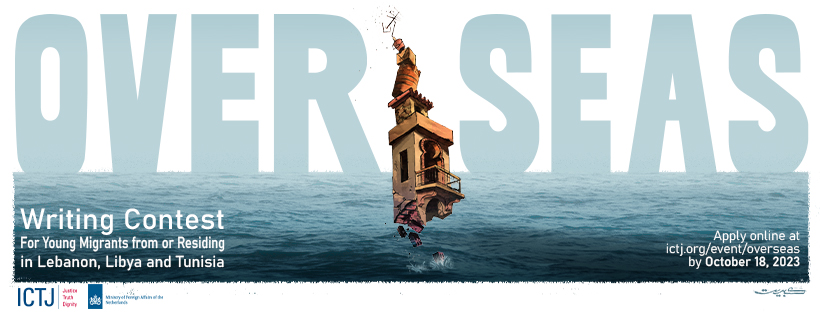
The International Center for Transitional Justice (ICTJ) is pleased to announce “Overseas,” a writing contest for young people originally from or currently residing in Lebanon, Libya, or Tunisia, up to 35 years old, who have left their home countries for political or socioeconomic reasons. This open call asks contestants to share their personal experiences of migration—the challenges they have faced and continue to face and their hopes for themselves and for the future of the country they left behind—in the form of a short-written testimony. The testimonies may describe cases of either regular or irregular migration.
Contestants must submit a completed application by 5:00 PM PST on October 18, 2023.
Incomplete applications will not be considered.
Lebanon has grappled with unending political gridlock and economic turmoil since the country’s 15-year civil war ended in 1990. Their hopes for a decent life dashed, countless Lebanese have left the country and now live abroad.
Seeking safety and opportunities, Libyans have been fleeing their country in droves ever since it descended into violent conflict in 2011.
Innumerable Tunisians left during Zine El Abidine Ben Ali’s 23-year dictatorship. But as the 2011 revolution that toppled him began failing to deliver on its promises and as the country backslid into consecutive political and economic crises, many others soon followed.
Worldwide, over 280 million people have embarked on a migration journey, to escape violence or repression, exercise or enjoy a wider range of their human rights, or simply build a better life for themselves and their families.
What’s your story of migration? Are you ready to tell it?
THE POWER OF STORYTELLING
Personal storytelling can help explain and give a human face to the cold numbers that statistics are made of. It can inspire, inform, and influence public and policy debates around migration and its root causes, and it can stimulate change and contribute to impactful solutions to the political and socioeconomic problems that forced individuals to leave their countries of origin in the first place.
Your testimony is storytelling in its essence. It can shed light on the nature and consequences of human rights violations and harmful socioeconomic policies, help shape society’s narrative and memory of recent and past abuses and encourage victims to come forward and make their voices heard and their perspectives and demands known.
Together with other justice-related initiatives, your testimony can help pave the way for needed political change and institutional and legislative reforms.
THE JURY
A jury composed of distinguished writers, artists, and human rights advocates from Lebanon, Libya, and Tunisia will evaluate the submissions based on their creativity, originality, and potential to trigger relevant and meaningful reflection, debate, and change. The jury will select five winners with the most compelling testimonies.
THE PRIZES
The five winners will be invited to participate in an international conference—all expenses paid (travel, accommodation, and other expenses). The conference will bring together policymakers and experts to discuss migration and its close relationship to human rights violations.
The winners will also have the opportunity to take part in a radio program on the topic produced by local media in Lebanon, Libya, or Tunisia, in partnership with ICTJ. Finally, their testimonies and other notable ones from the contest will be featured in a book, as well as on ICTJ’s website and social media channels.
Deadline: October 18, 2023
How to apply:
Contestants must be 35 years of age or younger and originally from or currently residing in Lebanon, Libya, or Tunisia.
Contestants must submit a completed application by 5:00 PM PST on October 18, 2023.
Incomplete applications will not be considered.
Submission requirements:
- The testimony must be original and never before published.
- The testimony must be in Arabic, English, or French.
- The testimony must not exceed 1,000 words.
- The contestant should provide explicit and informed consent allowing the testimony to be published and to appear in ICTJ publications and on ICTJ’s website and social media channels.
For more information, please contact one of the following:
Overseas@ictj.org
Salwa El Gantri, ICTJ Programs Senior Expert: Selgantri@ictj.org
Nour El Bejjani Noureddine, Head of ICTJ’s Lebanon Program: NElBejjani@ictj.org
Reem El Gantri, Head of ICTJ's Libya Program: Rgantri@ictj.org